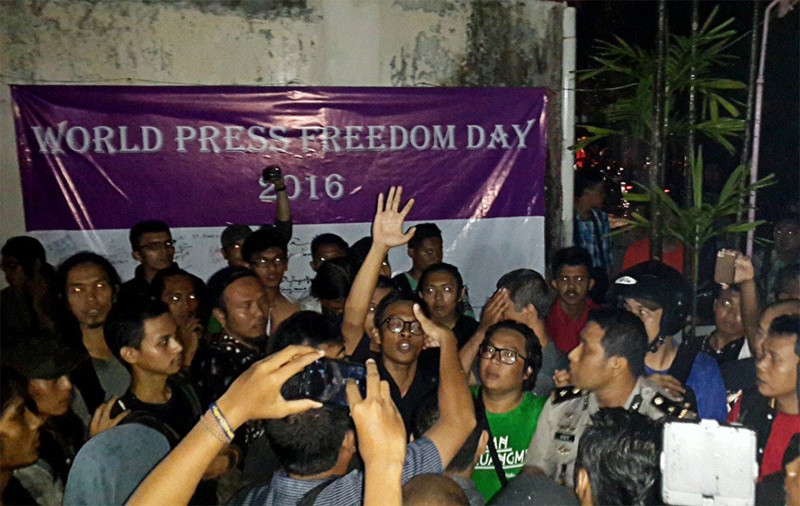Indonesian government wants to protect itself from insults
Change Size
 Stand up for rights – A heated debate takes place between journalists and police officers prior to the dispersal of a 2016 World Press Freedom Day celebration in Yogyakarta on May 3. The police urged journalists and press activists to disband the event, which planned to screen Pulau Buru Tanah Air Beta (Buru Island: My Homeland), a documentary by Rahung Nasution on the 1965 tragedy. ( (JP/Bambang Muryanto)
Stand up for rights – A heated debate takes place between journalists and police officers prior to the dispersal of a 2016 World Press Freedom Day celebration in Yogyakarta on May 3. The police urged journalists and press activists to disband the event, which planned to screen Pulau Buru Tanah Air Beta (Buru Island: My Homeland), a documentary by Rahung Nasution on the 1965 tragedy. ( (JP/Bambang Muryanto)
With the rise of social media, insulting the government for its flaws, or just for fun, has become easier than ever.
However, the government may no longer take such insults lightly if the House of Representatives approves its proposal that insulting the government be made a crime in the new Criminal Code (KUHP) bill.
The House’s Commission III, which is tasked with deliberating the bill, has been considering the proposal, asking the government to elaborate on what it means by the terms “insult” or “the government” to prevent any abuses of the legislation if the bill is passed.
“We haven’t made any decision yet. We still want to discuss it [with the government],” the commission’s deputy chairman, Benny K. Harman, told The Jakarta Post on Saturday.
In principle, the House has agreed to the proposal, acknowledging the fact that the government is chosen by the people. Although, it still has reservations.
“First, what constitutes the government? Second, what’s the definition of insulting? If they’re not clear, there’ll be problems,” Taufiqulhadi of the NasDem Party said.
Further deliberation was needed, he added, as we believe the proposed article would be subject to multiple interpretations.
“The article could easily be abused by regional governments because there is a tendency that the further [a region] is from the capital, the looser the interpretation [of the law by the political leaders] will be there.”
Muladi, a former law and human rights minister who is serving as a government representative in the deliberation of the bill, argued that there was a need to protect the government from insults because the public was also protected from insults by the law.
“Individuals are protected by the law. Why is the government, which is formally established, not protected by the law?” he said during a meeting at the House complex last week.
Muladi acknowledged the article was contentious, saying that it was imported from the British Indian Penal Code, which was at the time used to arrest freedom fighters during the colonial era.
“The [old] penal code was formulated with loose interpretations and without taking into account the consequences,” he said.
Therefore, the government has changed some wordings of the article from the penal code version.
“The words ‘feud’ and ‘hatred’ have been changed into ‘insults’. Insults mean any action that attacks someone’s good name and lowers his or her dignity,” said Muladi.
“Furthermore, there has to be proof that the insults result in public chaos. With these changes, we hope that [the article] will be more democratic and not easily used by people without any proof.”
Pro-democracy activists are not happy with the proposal.
The proposed article was still extremely dangerous and had no place in a democratic country like Indonesia, Institute for Criminal Justice Reform (ICJR) executive director Supriyadi Eddyono said.
“It is certain to create problems because this article was made by the Dutch for its colonies [to protect the Dutch],” he told the Post. “It was taken from the British penal code and inserted into the colonial’s criminal code. But now, the Dutch government no longer uses it because the context was to protect the Dutch government during colonialism.”
Supriyadi said the article would have the same adverse effects on freedom of speech as another article in the KUHP bill that criminalizes insulting the president. The article on insulting the president was declared unconstitutional by the Constitutional Court in 2006.
“Criticizing the president and the government should be fair game,” Supriyadi said, adding that it was impossible to objectively differentiate between an insult and legitimate criticism. “What makes the government think that it has a higher position than the public that it has to have its own defamation article with harsher punishment?” he asked.









